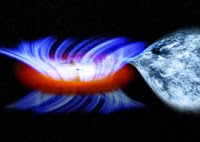We are all familiar
with the Doppler Effect, even if you do not know the term. Today, scientists
have found an alternative explanation for the phenomenon when the sound or the light spinning object is scattered. This discovery could help astronomers to
measure the rotation of the planet, or even improve the performance of wind
turbines.
Here is what the
principle of the Doppler Effect: when the object emitting the noise is moving
towards its sound waves converge together and produce a higher frequency.
Conversely, when the subject moves away, the sound waves are scattered. The
faster the object moves, the sharper the frequency difference.






